
Teaching forgiveness to preschoolers is an essential part of their spiritual and emotional development. This page offers simple and engaging ways to introduce the concept of forgiveness through Bible stories, crafts, books, and activities designed specifically for young children.
Definition: Treating someone as though they never hurt you; not holding a grudge; not blaming them
Opposite: Bitter, getting even
Joseph Forgives His Brothers (Genesis 37-50)
Joseph’s brothers sold him into slavery, but years later, Joseph forgave them and provided for their needs during a famine, showing the power of forgiveness.
The Prodigal Son (Luke 15:11-32)
This parable tells the story of a father who forgives his son after he leaves home and wastes his inheritance, illustrating God’s unconditional forgiveness.
Jesus Forgives and Heals a Paralyzed Man (Luke 5:17-26)
Jesus not only healed a paralyzed man, but also forgave his sins, showing that forgiveness is just as important as physical healing.
Peter Denies Jesus but Is Forgiven (Luke 22:54-62, John 21:15-19)
After Peter denied knowing Jesus three times, Jesus later forgave Peter and reinstated him, showing that God forgives even our biggest mistakes.
Jesus Forgives Those Who Crucify Him (Luke 23:34)
As Jesus was being crucified, He asked God to forgive those who were causing His suffering, demonstrating the ultimate act of forgiveness.
How to Apologize by David LaRochelle beautiful shares how to apologize and mean it. This book uses animals to demonstrate practical tips on making heartfelt apologies, explaining how to own up to mistakes, express sincerity, and seek forgiveness.
The Berenstain Bears and the Golden Rule is a children's book that teaches the importance of the Golden Rule—"Do unto others as you would have them do unto you." In the story, Sister Bear learns this lesson when she befriends a new student, despite peer pressure. Through her actions, she realizes the value of kindness, empathy, and treating others with respect, showing how following the Golden Rule can make a positive impact.
VeggieTales Classics - God Wants Me to Forgive Them? highlights how difficult it can be to forgive others but emphasizes that God wants us to let go of grudges and extend grace. With humor and relatable situations, it encourages young viewers to understand the value of forgiveness and the joy that comes from choosing to forgive.
I'm Sorry by Michael Ian Black is a humorous children's book that dives into the awkwardness of apologizing. The story follows Potato, after making a mistake, struggles to offer a heartfelt apology to Flamingo. Through exaggerated excuses and humorous deflections, Potato learns the importance of a sincere apology.
Punk the Skunk Learns to Say Sorry by Misty Black teaches children the importance of apologizing and taking responsibility for their actions. In this story, Punk the Skunk accidentally hurts his friends’ feelings with his words and actions but initially refuses to say sorry. As the story progresses, Punk realizes the impact of his behavior and learns that a heartfelt apology can mend friendships. It’s a valuable lesson on empathy, forgiveness, and making amends, especially for young readers.
Equip a child with spiritual tools in this fun, play-based Armor of God study. Through engaging activities and Bible lessons, children will learn how to wear and wield the armor God provides. Help them stand strong in their faith with this hands-on, faith-building experience.
Mrs. Rosey Posey and the Yum-Yummy Birthday Cake follows Mrs. Rosey Posey as she prepares a delightful birthday cake for her friend. The story emphasizes themes of friendship and the joy of celebration, showcasing how Mrs. Posey's love and care make the occasion special. As she gathers ingredients and decorations, children learn about the importance of sharing and making memories together.
VeggieTales: The Wonderful Wizard of Ha's is a delightful adaptation that combines humor and lessons about courage and self-identity, inspired by the classic tale of The Wizard of Oz. In this episode, Larry the Cucumber portrays a character who learns the importance of being true to oneself. Along the way, themes of faith and friendship are woven into the storyline, making it both entertaining and educational for children.
Lilly's Purple Plastic Purse by Kevin Henkes shares the story of a mouse who wants to be a teacher, just like his teacher Mr. Slinger. When Lilly gets a new purple plastic purse, she’s eager to show it off. However, her excitement leads to disruption in class, and Mr. Slinger takes the purse away for the day. Upset, Lilly reacts impulsively but soon realizes her mistake. The story is about dealing with disappointment, learning from mistakes, and the power of apologies.
Kindness is my Superpower: A children's Book About Empathy, Kindness and Compassion by Alicia Ortego is a children’s book that teaches empathy, kindness, and compassion. It follows Lucas, a boy who learns the importance of being kind after making a mistake. Through simple yet impactful lessons, children discover how small acts of kindness can make a big difference in others' lives.
In Sorry (Really Sorry) by Joanna Cotler, a cow's unkindness towards a duck sets off a chain reaction of rudeness among the animals. As each character responds negatively, the cycle continues until a dog breaks the pattern by showing empathy and forgiveness when a pig is rude to him. This pivotal moment transforms the atmosphere, leading to a chain of kindness and apologies that positively impacts everyone involved.
I'm Sorry! by Barry Timms explores themes of apology and forgiveness. Scribble and Scoop have an argument and must learn how to repair their friendship. Discover what say sorry really means and how it only works if you really mean it.
Shorten the verses as appropriate for the child's developmental level.
Tune: “Are You Sleeping?” or “Where is Thumbkin?”
Ephesians 4:32 (2x)
Forgiving one another (2x)
Just as God through Christ, has forgiven you
Ephesians 4:32, Forgiving one another
Psalm 86:5 (NIV)
You, Lord, are forgiving and good, abounding in love to all who call to you.
Romans 10:9 (NIV)
If you declare with your mouth, “Jesus is Lord,” and believe in your heart that God raised him from the dead, you will be saved.
Psalm 103:12 (NIRV)
He has removed our sins from us. He has removed them as far as the east is from the west.
Matthew 18:21-22 (NIV)
Then Peter came to Jesus and asked, “Lord, how many times shall I forgive my brother or sister who sins against me? Up to seven times?” Jesus answered, “I tell you, not seven times, but seventy-seven times.
Leviticus 19:18 (NIRV)
"Do not try to get even. Do not hold anything against any of your people. Instead, love your neighbor as you love yourself. I am the Lord."
1 John 1:9 (NIV)
If we confess our sins, he is faithful and just and will forgive us our sins and purify us from all unrighteousness.
Mark 11:25 (NIV)
And when you stand praying, if you hold anything against anyone, forgive them, so that your Father in heaven may forgive you your sins.
Act 3:19 (NIV)
Repent, then, and turn to God, so that your sins may be wiped out, that times of refreshing may come from the Lord.
Nehemiah 9:17b (NIV)
But you are a forgiving God, gracious and compassionate, slow to anger and abounding in love.
Psalm 86:5 (NIV)
You, Lord, are forgiving and good, abounding in love to all who call to you.
Luke 11:4a (NIV)
Forgive us our sins, for we also forgive everyone who sins against us.
Do you desire to parent or teach children the way that God desires? Watch this 3-part series to acquire the tools to build a solid foundation of biblical discipline for your family or classroom.
All Printables Free for Immediate Family Use and with a Current License Only
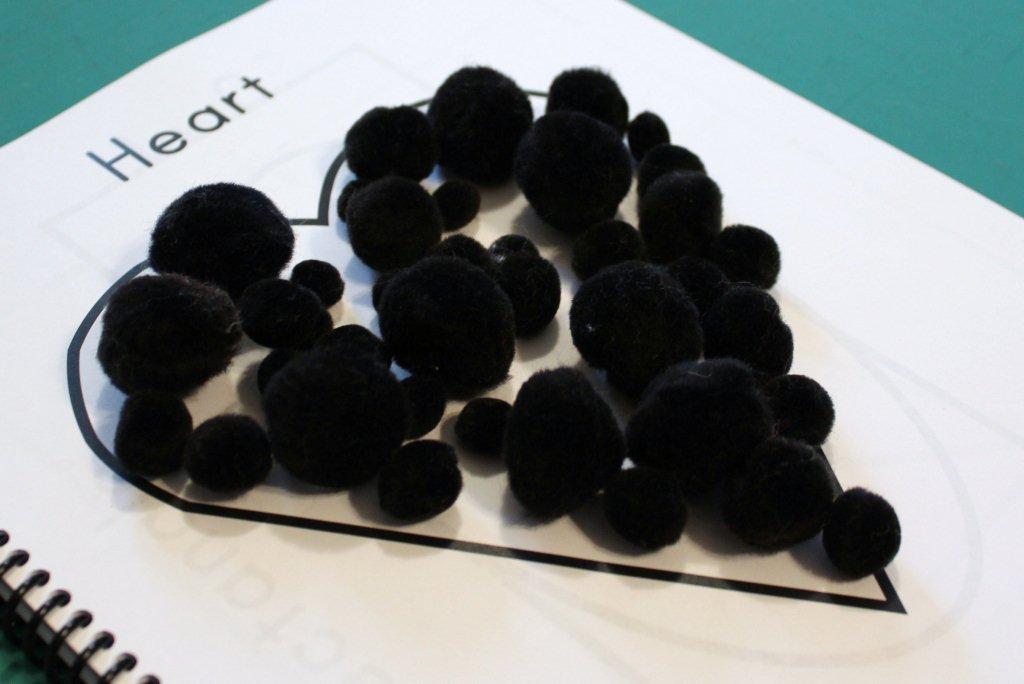
Gather black pompoms and print off the Heart Template. Explain that sin represents the bad choices we make and is like black spots on our heart. Take turns naming a sin (e.g., lying, stealing) and place a black pom-pom on the heart to represent each sin. Discuss how our sins prevent God from looking upon us and emphasize the need for His forgiveness to cleanse our hearts. As you remove each pom-pom, say, "God, please forgive me for ___." Finally, talk about how God forgives us and makes our hearts as white as snow (Ps. 51:7).
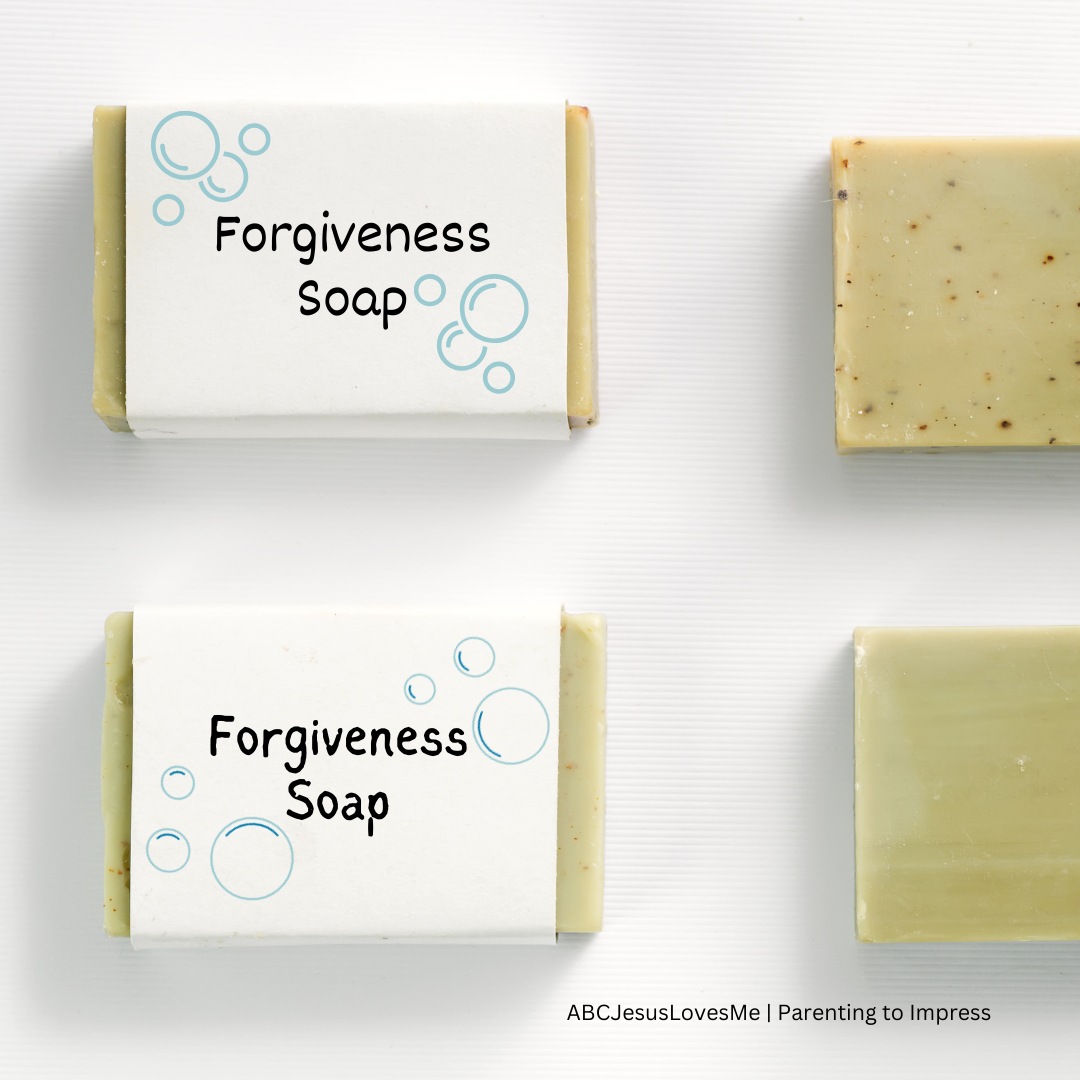
Draw the outline of a person on a piece of paper. Explain that sin, or the wrong choices we make, clouds our hearts and separates us from God. Encourage your child to share examples of sins and write them on the figure. Describe God's forgiveness through Jesus as a super soap that washes away our sins when we sincerely ask for forgiveness. To complete the activity, decorate a piece of paper as a bar of soap with stamps, crayons, stickers, or markers, and then tape the label on it.
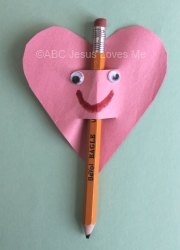
Supplies: Pencils of various shapes and sizes with good erasers, construction paper or craft foam heart, googly eyes.
Instructions: Show the child the pencils and discuss their differences—short, tall, thin, fat—but highlight that they all have one thing in common: erasers for mistakes. Explain that just like the pencils, we all make mistakes, but we have an eraser too: God. When we seek forgiveness, God wipes away our sins like an eraser.
Next, cut out a 2-3" heart from the construction paper or craft foam. Fold the heart in half and make two small slits for threading the pencil—one near the top and one near the bottom. Ensure the slits are not too big, or the heart will slide off. Let the child decorate the heart to resemble a person with googly eyes, a mouth, and a nose, and then thread the pencil through the heart.
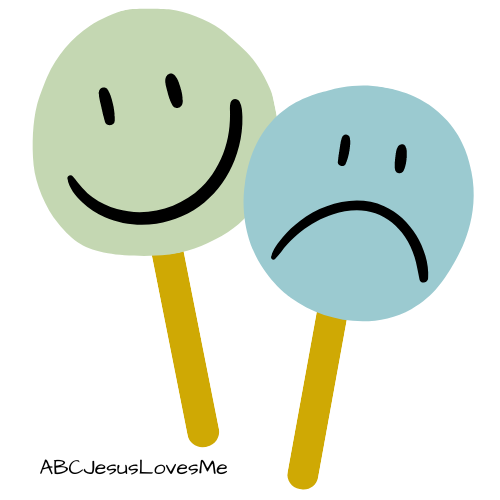
Glue two circles onto a Popsicle stick, one with a happy face and one with a sad face (or use the Teaching Emotions printable). Explain that the faces are to remind the child about forgiving others. When we forgive, we feel happy inside but when we don't forgive, we feel sad inside.
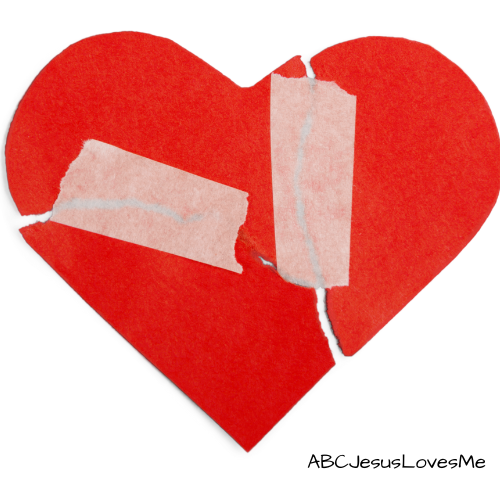
Give the child a paper heart or have them cut out a large heart. Share examples of ways people can hurt others' feelings (e.g., hitting, saying unkind words), and let the child offer their own ideas. Ask them to tear the heart in half to represent the hurt feelings. Explain that asking for forgiveness helps heal a hurt heart. Then, help the child tape the heart back together, showing how forgiveness can mend broken relationships.
A friend shared a four-part way to teach children to apologize. I love the inner two steps. Read more...
Create simple role-playing scenarios where a child has to forgive someone. For example, one child spills another's crayons. Guide them through how to apologize and offer forgiveness. I like to use the phrase, "I am sorry that I ______. Will you please forgive me?" "I forgive you for ______."
Have children draw or paint a rainbow, then write the word “Forgiveness” across it. Explain how forgiveness brings peace and happiness, just like a rainbow after a storm.